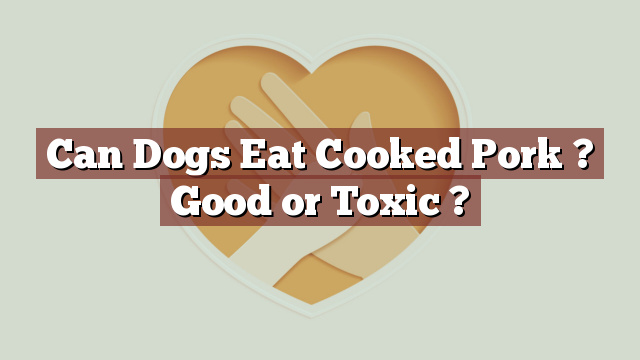Can Dogs Eat Cooked Pork? Good or Toxic?
Knowing what foods are safe for our furry friends is crucial for their health and well-being. In this article, we will explore whether cooked pork is a suitable addition to a dog’s diet. We will discuss its nutritional value, safety, potential risks, and benefits. In addition, we will provide guidance on what to do if your dog consumes cooked pork.
Nutritional Value of Cooked Pork: Proteins, Vitamins, and Minerals
Cooked pork is a protein-rich food that contains essential amino acids necessary for the growth and maintenance of a dog’s muscles. It is also a good source of vitamins B6 and B12, which play a vital role in promoting a healthy nervous system. Moreover, pork provides minerals such as iron, zinc, and selenium, contributing to overall canine health.
Can Dogs Eat Cooked Pork? Safety and Toxicity Explained
Dogs can eat cooked pork, but certain precautions must be taken to ensure their safety. While pork itself is not toxic to dogs, it is important to note that certain conditions must be met before feeding it to your canine companion. Firstly, the pork must be thoroughly cooked, as raw or undercooked pork can contain harmful bacteria such as salmonella or trichinella. Secondly, seasoning and sauces should be avoided, as they can contain ingredients that are toxic to dogs, such as onions or garlic.
Furthermore, it is crucial to feed cooked pork in moderation. Excessive consumption can lead to digestive issues like pancreatitis or upset stomach. It is always recommended to consult with a veterinarian before introducing any new food into your dog’s diet.
Potential Risks and Benefits of Dogs Consuming Cooked Pork
While cooked pork can provide nutritional benefits to dogs, it also poses potential risks. One of the main concerns is the high fat content in certain cuts of pork. Excessive fat intake can lead to obesity and associated health problems in dogs. Therefore, it is essential to trim off any visible fat and opt for lean cuts of pork.
Another risk to consider is the presence of bones. Cooked pork bones can splinter and cause serious injuries to a dog’s digestive tract. It is crucial to ensure that cooked pork is boneless.
On the other hand, when fed in moderation and prepared properly, cooked pork can be a valuable addition to a dog’s diet. It can provide essential proteins, vitamins, and minerals that contribute to their overall health and well-being.
What to Do If Your Dog Eats Cooked Pork: Immediate Actions
If your dog accidentally consumes cooked pork, it is important to assess the situation and take immediate actions if necessary. If the pork was raw or undercooked, monitor your dog for any signs of gastrointestinal distress such as vomiting, diarrhea, or abdominal pain. In such cases, it is crucial to contact your veterinarian for guidance.
If your dog has consumed a small amount of properly cooked pork, there may not be an immediate cause for concern. However, always observe your dog for any unusual symptoms or changes in behavior. If you notice any adverse effects, contact your veterinarian for advice.
Conclusion: Moderation and Supervision Key for Dog’s Diet
In conclusion, cooked pork can be a safe and nutritious addition to a dog’s diet when prepared and fed in moderation. It provides essential proteins, vitamins, and minerals that contribute to their overall health. However, certain precautions must be taken, such as ensuring the pork is thoroughly cooked, avoiding seasoning or sauces, and trimming off excess fat. It is always important to consult with a veterinarian before introducing any new food into your dog’s diet to ensure it is suitable for their specific dietary needs. Remember, moderation and supervision are the key factors in maintaining a balanced and healthy diet for your furry friend.
Thank you for investing your time in exploring [page_title] on Can-Eat.org. Our goal is to provide readers like you with thorough and reliable information about various dietary topics. Each article, including [page_title], stems from diligent research and a passion for understanding the nuances of our food choices. We believe that knowledge is a vital step towards making informed and healthy decisions. However, while "[page_title]" sheds light on its specific topic, it's crucial to remember that everyone's body reacts differently to foods and dietary changes. What might be beneficial for one person could have different effects on another. Before you consider integrating suggestions or insights from "[page_title]" into your diet, it's always wise to consult with a nutritionist or healthcare professional. Their specialized knowledge ensures that you're making choices best suited to your individual health needs. As you navigate [page_title], be mindful of potential allergies, intolerances, or unique dietary requirements you may have. No singular article can capture the vast diversity of human health, and individualized guidance is invaluable. The content provided in [page_title] serves as a general guide. It is not, by any means, a substitute for personalized medical or nutritional advice. Your health should always be the top priority, and professional guidance is the best path forward. In your journey towards a balanced and nutritious lifestyle, we hope that [page_title] serves as a helpful stepping stone. Remember, informed decisions lead to healthier outcomes. Thank you for trusting Can-Eat.org. Continue exploring, learning, and prioritizing your health. Cheers to a well-informed and healthier future!

